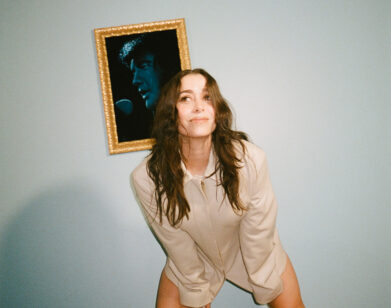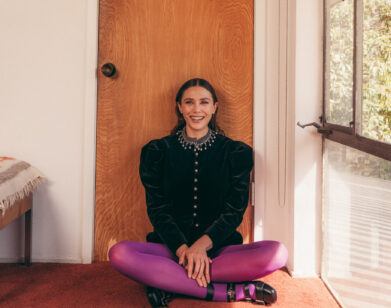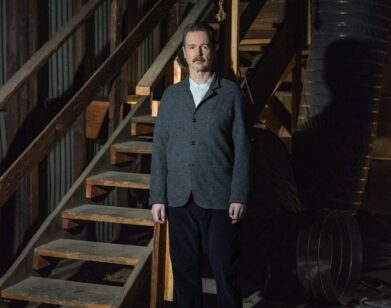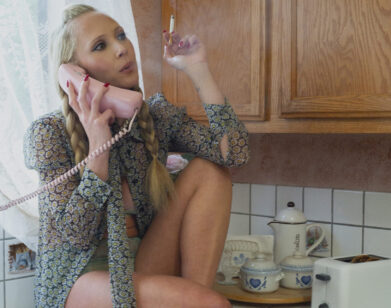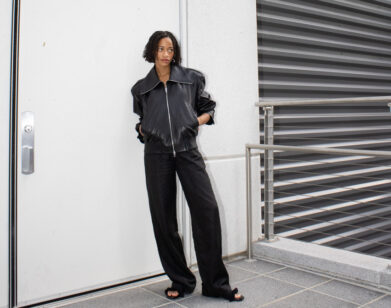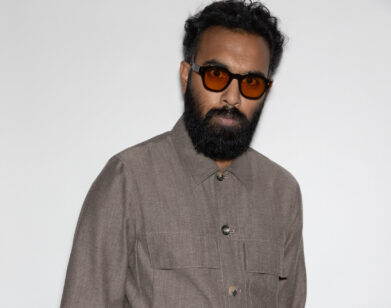Ry Russo-Young is Not to Be Missed
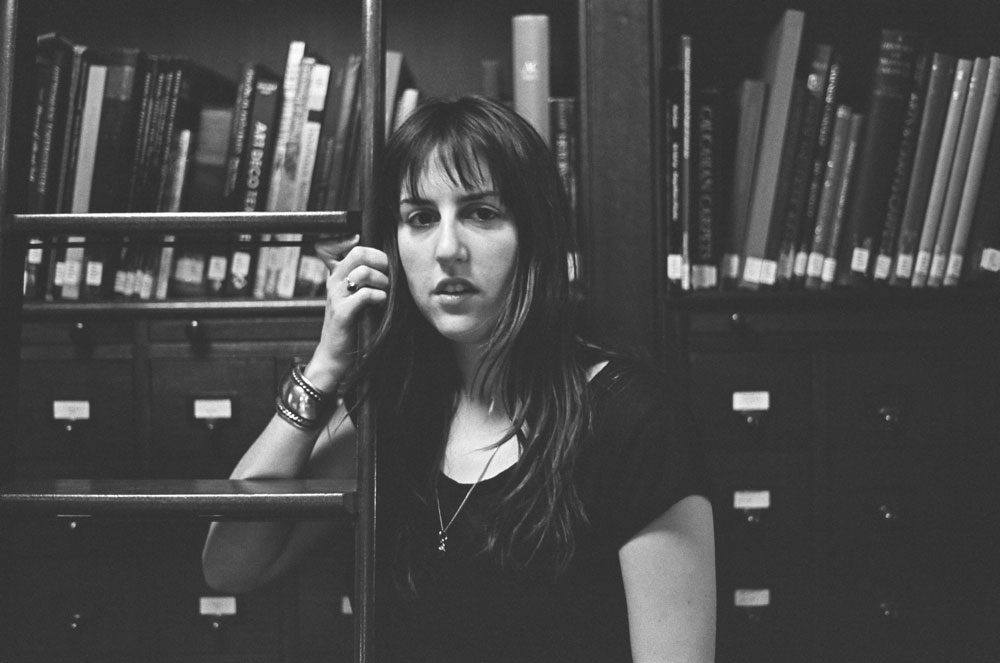
PHOTO BY JACK SIEGEL
Ry Russo-Young’s latest film, You Wont Miss Me, is the kind of movie that gets in your head. It’s set over a few days in the life of Shelly Brown, a 23-year-old city dweller who has trouble distinguishing between truth and performance, and who has just been released after a three-day stint in a mental hospital. The film is a haunting portrait of a mind in limbo: its plot is not crucial; it meanders as Shelly does. Shelly is played (and was co-written) by the breakout star Stella Schnabel (daughter of Julian), who will soon appear as Lisa in her father’s film, Miral, and she plays the role so effectively and effusively that it’s easy to forget she and Shelly are not the same person. The film’s style, too, reflects her disorganized mind: it’s shot in a variety of formats and styles, including grainy Flip-cam footage; and the scenes range from fully rehearsed to guerilla-style verité.
The director, Russo-Young, is a prominent player in the DIY-filmmaking scene; she has acted in mumblecore classic Hannah Takes the Stairs, directed a 2007 feature called Orphans, and went to this year’s June Sundance Screenwriters Lab to work on her next feature, Nobody Walks, which she co-wrote with current indie darling Lena Dunham. Russo-Young braved Arctic temperatures in New York and stopped by Interview‘s office yesterday to talk about all this—and much more.
ALEXANDRIA SYMONDS: Are you warming up?
RY RUSSO-YOUNG: I feel very good. This is really soothing and beautiful in here.
SYMONDS: So how’s your day going? What have you been up to?
RUSSO-YOUNG: I’ve been working on my new movie, for most of the day. I mean, doing some You Wont Miss Me stuff, but mainly looking over the script again for a movie I co-wrote with Lena Dunham that I’m going to shoot in the spring. It’s called Nobody Walks. We went to the Sundance Screenwriters Lab, and we recently did a reading of it, where they cast actors and they all it read it aloud and we listen. After that reading, we’re taking one more pass on the script. It’s nice to just look at it in the morning when I’m really fresh, and just see what I think about it, having woken up first thing in the morning, as if I’d never seen it before.
SYMONDS: Are you a person who’s able to wake up early in the morning and get work done?
RUSSO-YOUNG: Yeah, I’m kind of a morning person. I wake up in the morning the most happy, because there’s the promise of a new, fresh day. At night, there’s something kind of sad to me, always. When it gets dark, that means everything has already happened that day.
SYMONDS: So let’s talk about You Wont Miss Me. Have you been friends with Stella for a while, or was it just when you were casting the film that you got to know her?
RUSSO-YOUNG: I’ve been best friends with her older sister, Lola, since I was five years old. She was my first friend, and my best friend in the whole wide world. I always knew Stella as Lola’s younger sister, hanging out around the house.
SYMONDS: You watched her grow up.
RUSSO-YOUNG: Oh, totally, yeah. I’ve known her for years, and then we reconnected after I got back from Oberlin, where I went to college. And she said, “I’m acting now, let’s do something together,” and I was completely flattered by the fact that she would want to work with me.
SYMONDS: How long ago was that?
RUSSO-YOUNG: That was probably in 2008. And from there, we sat down together, and we didn’t know what it was going to be. I had already made my last movie, Orphans, and so I was into film, and I was digging that, and she said she was into acting. But we didn’t know what form it was going to take—whether it was going to be a short film, or a play, or—and we created this character Shelly Brown, and wrote a biography of her. Where she went to school, how she wore her hair, what her favorite color was, all those things. And then I sat and I interviewed the character for three hours on-camera. And we shot a couple scenes, and then I went home and I watched that footage, and it was like, What is this? What does this want to be? And I was just completely riveted by her performance, by this character and the idiosyncratic nature of who she was. It was just fascinating. Literally, my face felt sucked into her.
SYMONDS: When you watch Stella in the film, it feels like such a natural performance—was that because she got super into the character and went Method with it, or was it more because there was a lot of Stella in Shelly?
RUSSO-YOUNG: It’s much to her credit, because I think Stella’s a really great actress and she can be really comfortable with the camera—she’s not intimidated by cameras the way a lot of non-actors are. And she’s very comfortable with her body and herself. I think also, because we have known each other so long, there was an intimacy with our friendship. It wasn’t like, “Okay, I’m going to shoot you now and we’re going to make a movie,” it was like we were kind of creating it together from the ground up, and it felt like a safe space for us both to be able to make something that was honest and real. And that was the goal of the movie: to make a character that was so real that you felt like after you walked out of the movie, you would see her on the street.
SYMONDS: I was wondering about the scenes in the film where Shelly goes on auditions, for theater and film roles.
RUSSO-YOUNG: Well, I studied acting for a bunch of years—I studied at HB Studio and Lee Strasberg, and I did Yale summer drama programs where you do really intense Method acting. I come from a background of really heavy acting training, and I’ve always found the process fascinating.
SYMONDS: The audition process?
RUSSO-YOUNG: Not just the audition process, but the process of acting—trying to find another person. I once did a sense memory exercise at Yale, where you close your eyes and imagine certain things, like the smell of roasted apples, apple sauce that your mom made when you were seven years old, or something. It’s just amazing how you can channel certain things and characters, based on smells and ideas and memories. I was just very moved and impressed by it, when I studied acting.
The audition process is a different set of skills from the acting process. It’s so unnatural, and as an actor, you walk into this world that’s completely unfamiliar, and you have to become a part of that world and adapt to it really instantaneously.
SYMONDS: Well, it’s nice that Stella didn’t have to audition.
RUSSO-YOUNG: It’s a much more humane process that way.
SYMONDS: How did you create the theater-director character?
RUSSO-YOUNG: His name is Gil Kofman, the guy who played the director, and he actually co-edited the movie with me. I met him at a film festival, and I just thought that he was such a character and was so smart, and just had so much to offer… This movie was a great opportunity to be open to, if I met someone like Gil, to be like, “Do I have a part for Gil? Is there a way to work Gil in?” And he had a history in theater and has written plays.
SYMONDS: Was he offended when you asked him to play this lecherous character?
RUSSO-YOUNG: No, he thought it was hysterical. We played around a lot on that scene, in terms of how far it was going to go. We had a lot of discussions in advance about how far he should take the character—how far towards humor, and how far towards creepiness, and all those things. The monologue that she performs in that scene was a monologue pulled from one of his plays that he wrote in real life.
SYMONDS: Really? Wow. That’s so interesting. I would love to see that play.
RUSSO-YOUNG: I think it’s called Pharmacopia, and it’s filthy. The whole play is, his writing is brilliant and filthy. It’s like the writings of a maniac genius.
SYMONDS: Speaking of which, did you and Stella have conversations about whether or not Shelly is mentally ill?
RUSSO-YOUNG: My sister’s mentally ill, and I think whether you’re mentally ill—there’s a very big spectrum. There’s so many things that are—like sexuality, whether you’re straight or gay, I think there’s a very big spectrum, and there’s a lot of gray area in between. And it’s the grayness that’s interesting to me. With her mental illness, I always saw that she was in the hospital because she threw a lamp at her mom, right? Which is technically in the movie. And she was in there for three days, but she gets kicked out of the hospital, because she’s not certifiable. But she’s definitely questionably on the verge. But we didn’t talk about it. I think we both understood where the character was psychologically, without having to say, like, “Is she crazy?”
SYMONDS: I thought the therapy scenes were some of the most revealing. How much of that was in the script and how much was improvised?
RUSSO-YOUNG: The guy who played the therapist is named Noah Kimmerling, and he was an accountant before he became an actor. He was my parents’ accountant my entire childhood. This is just how personal a movie it is.
SYMONDS: I want to go down the entire cast list with you now, and find out where each of these people fits in your life.
RUSSO-YOUNG: You could, and there’s a long history for each. He was an accountant, and he always kind of scared me—I remember as a kid, I would come with my mom, and he always scared me. And I knew that he had become an actor and had quit accounting… and his wife worked in the mental-health profession. And I didn’t know that when I cast him, but when him and I had some conversations, we thought it was really important that he give an accurate depiction and say something that a therapist would say. He was very rehearsed, and he had his lines all set out—he knew exactly what he was going to say, and he wasn’t into deviating from that.
SYMONDS: Which actually is not so dissimilar from how real therapists function, I would think. They have a script.
RUSSO-YOUNG: Yeah, they do… in a way. But she didn’t. So that made the scene really interesting, and made her have to be more on her toes. And I think she’s incredible in those scenes, because she’s just so vulnerable, and open, and it’s almost like her face is ripped open and she’s just absorbing it. And I think she’s a character that doesn’t really like authority, and so having him be this intense presence of authority, with these set lines, really unsettled her, made her really uneasy and almost scared her in a way that comes across.
SYMONDS: To come back to the audition scenes—the last one, where Shelly auditions for a low-budget film and real-life independent filmmaker Aaron Katz plays the director, seems like it’s supposed to be kind of a meta experience. How much of that were you looking to do, and how much did you want to stay away from the idea of making a meta movie?
RUSSO-YOUNG: I mean, I think the way that we blend fiction and reality sort of makes it a meta-movie—in terms of the different formats, in terms of how much Stella is like the character, the improvisation—and it takes it one step further to have it be a film that you would sort of recognize. My inspiration for that last audition scene was Blow Up. You know that scene where the two models destroy the paper backdrop? I almost wanted to do like a modern-day Blow Up, at least in terms of the aesthetic, so it would be something that is sort of recognizable as a DIY independent movie, but it’s also an homage to Blow Up.
It’s what is hip in the moment as a visual trend. Blow Up is high fashion, the ’60s, and you have these models, and the set paper, and that’s the scene of that moment, and he’s on the cusp of that scene. And so it felt relevant to have Shelly walk into that world that’s like “what’s going on right now” in film. And for it to be a different kind of audition wouldn’t have been really believable, and it wouldn’t have had the energy and the riskiness that that scene actually has. So it was both an homage and a modern, um…
SYMONDS: Like a reinterpretation?
RUSSO-YOUNG: Yeah, in a way! It’s funny, because I always knew that Blow Up was the reference—but I didn’t realize specifically why, until I just said that.
YOU WONT MISS ME IS CURRENTLY PLAYING AT CINEMA VILLAGE; IT WILL EXPAND TO A GREATER LIMITED RELEASE TOMORROW.

